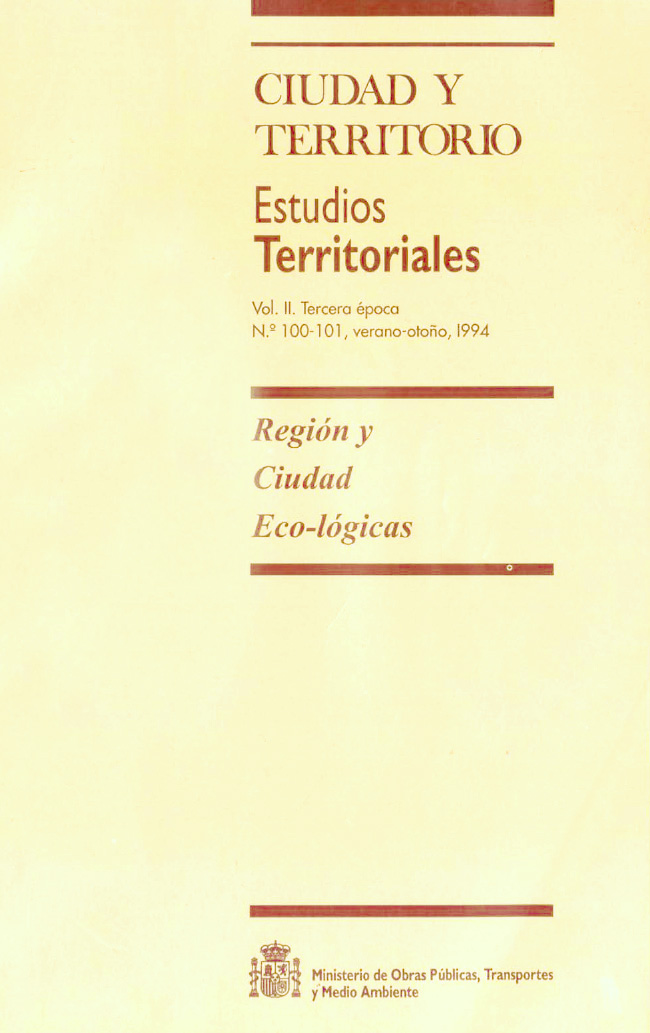The urban ecological system and the regulating mechanisms to its self-generating variables
Abstract
The city is considered as an ecosystem where the men and their societies are its subsystems. The functioning of the city is based on autoregenerative variables whose mechanisms that regulate its flexibility being the dialectical competition-exploitation versus cooperation-conservation. On the other hand, the connection and interphase between the subsystems, men, society and ecosystem which integrate them are analized, coming to the conclusion that the conscience is formed as the interphase between them. We arrive to the conclusion that this one is organized in terms of objectives and due to this, it is possible that the connection might be incomplete and distortioned. This is a mechanism to reduce and allow us to reach what we want, not to act in a sistematic way but for following the shortest, logical or causal way. It is considered that this teleological way of proceding in the solving of the cityzens' problems, is one of the main causes that provoke disfunctions in the urban system. It is noted that the predominant purposes of the conscience have their base in the determination of other peoples' behaviour in the use and transformation of the other things, and that those purposes are based on the organizations created by men. Finally, the complexity of the urban ecosystem is analized and two models of the space ocupation and material use, the energy and the time are discused. One is the zonal functionalist system and another one is a model based on the diversity and complexity increase from the parts of the system, and also a major energetic efficiency, and meterials and time saving.
Downloads
Downloads
Published
How to Cite
Issue
Section
License
Copyright (c) 1994 Salvador Rueda

This work is licensed under a Creative Commons Attribution-NonCommercial-NoDerivatives 4.0 International License.
Considering the provisions of the current legislation on Intellectual Property, and in accordance with them, all authors publishing in CyTET give -in a non-exclusive way and without time limit- to the Ministry of Transport, Mobility and Urban Agenda the rights to disseminate, reproduce, communicate and distribute in any current or future format, on paper or electronic, the original or derived version of their work under a Creative Commons Attribution-NonCommercial-NoDerivative 4.0 license International (CC BY-NC-ND 4.0), as well as to include or assign to third parties the inclusion of its content in national and international indexes, repositories and databases, with reference and recognition in any case of its authorship.
In addition, when sending the work, the author(s) declares that it is an original work in which the sources that have been used are recognized, committing to respect the scientific evidence, to no longer modify the original data and to verify or refute its hypothesis. Author(s) also declare that the essential content of the work has not been previously published nor will it be published in any other publication while it is under evaluation by CyTET; and that it has not been simultaneously sent to another journal.
Authors must sign a Transfer of Rights Form, which will be sent to them from the CyTET Secretariat once the article is accepted for publication.
With the aim of promoting the dissemination of knowledge, CyTET joins the Open Journal Access (OA) movement and delivers all of its content to various national and international indexes, repositories and databases under this protocol; therefore, the submission of a work to be published in the journal presupposes the explicit acceptance by the author of this distribution method.
Authors are encouraged to reproduce and host their work published in CyTET in institutional repositories, web pages, etc. with the intention of contributing to the improvement of the transfer of knowledge and the citation of said works.








 Enlace a CyTET en Linkedin
Enlace a CyTET en Linkedin